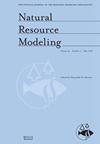Assessing the load capacity curve hypothesis considering the green energy transition, banking sector expansion, and import price of crude oil in the United States
IF 2.1
4区 环境科学与生态学
Q3 ENVIRONMENTAL SCIENCES
引用次数: 0
Abstract
The existing literature consists of various studies that have addressed the interrelationship between banking expansion and carbon emissions but failed to consider supply‐side ecological issues. Keeping this in view, the research aims to assess the impact of green energy transition, banking sector expansion, and import price of crude oil on the “load capacity factor (LCF)” in the United States from 1990 to 2021. The “LCF” has emerged as a novel ecological proxy to date that includes both “biocapacity and ecological footprint.” Using the “bootstrap autoregressive distributed lag” model, the research found that the consumption of renewable energy can enhance the ecological quality of the United States. The results verified the acceptance of the “load capacity curve” hypothesis. Moreover, it demonstrates that banking development promotes environmental quality. Specifically, a 1% improvement in the banking industry leads to a 0.93% increase in the LCF in the short term, as well as a 1.28% increase in the long run. Furthermore, the increase in crude oil import prices has a positive impact on the LCF and eventually promotes environmental sustainability. To be precise, a 1% rise in the price of imported crude oil results in a 0.35% increase in the long‐term LCF level. These results were backed by the findings of several robustness tests. The study, lastly, recommends that the banking sector and government policymakers should use banking growth in promoting green energy to attain their target of zero carbon emissions by 2050.考虑到美国绿色能源转型、银行业扩张和原油进口价格,评估负载能力曲线假设
现有文献包括各种研究,这些研究探讨了银行业扩张与碳排放之间的相互关系,但没有考虑供应方的生态问题。有鉴于此,本研究旨在评估 1990 至 2021 年间绿色能源转型、银行业扩张和原油进口价格对美国 "负载能力系数(LCF)"的影响。迄今为止,"LCF "已成为一种新型的生态替代指标,其中包括 "生物能力和生态足迹"。研究利用 "自举自回归分布滞后 "模型发现,可再生能源消费可以提高美国的生态质量。研究结果验证了 "负载能力曲线 "假设的可接受性。此外,研究还证明了银行业发展对环境质量的促进作用。具体而言,银行业每提高 1%,短期内可使低碳框架增加 0.93%,长期内可使低碳框架增加 1.28%。此外,原油进口价格上涨也会对 LCF 产生积极影响,并最终促进环境的可持续发展。确切地说,进口原油价格每上涨 1%,长期的低温室气体浓度水平就会增加 0.35%。若干稳健性测试的结果也支持这些结果。最后,研究建议银行业和政府决策者应利用银行业增长促进绿色能源发展,以实现 2050 年零碳排放的目标。
本文章由计算机程序翻译,如有差异,请以英文原文为准。
求助全文
约1分钟内获得全文
求助全文
来源期刊

Natural Resource Modeling
环境科学-环境科学
CiteScore
3.50
自引率
6.20%
发文量
28
审稿时长
>36 weeks
期刊介绍:
Natural Resource Modeling is an international journal devoted to mathematical modeling of natural resource systems. It reflects the conceptual and methodological core that is common to model building throughout disciplines including such fields as forestry, fisheries, economics and ecology. This core draws upon the analytical and methodological apparatus of mathematics, statistics, and scientific computing.
 求助内容:
求助内容: 应助结果提醒方式:
应助结果提醒方式:


